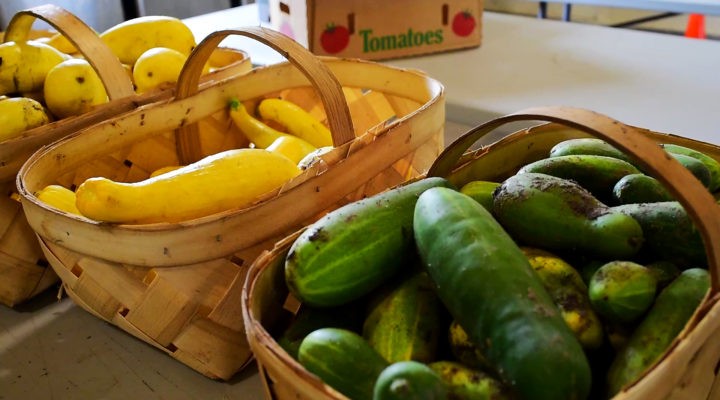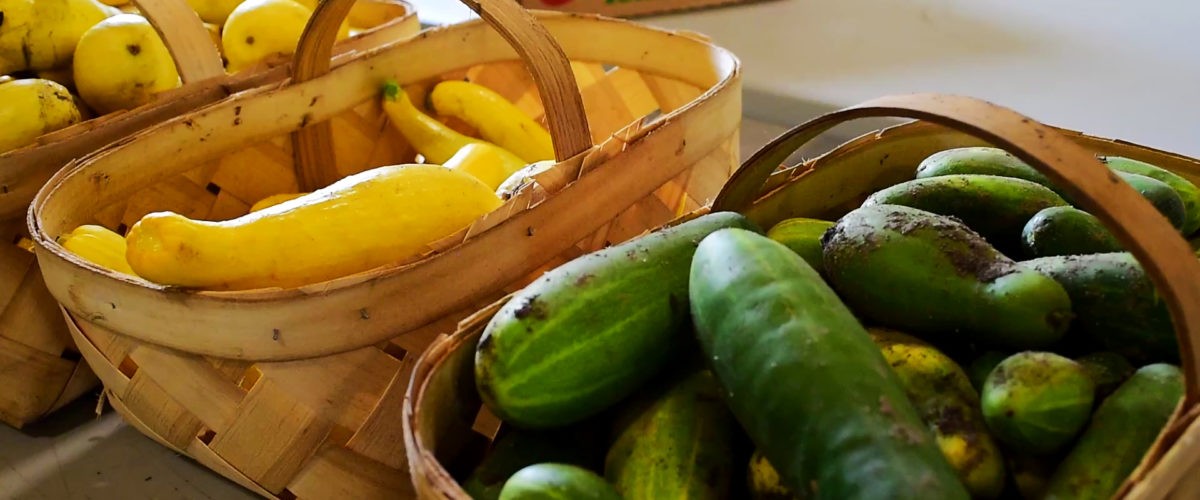“Don’t be angry at the land. The farm has not stolen anything from you. It’s the person who has stewardship over the farm. That’s the thief, not the soil. The soil will give to any person.”
The first time Reverend Richard Joyner heard these words, he could scarcely have understood their magnitude. His father, a sharecropper in Greenville, North Carolina’s Bell Fort community, spoke them to Joyner as a boy. Even as a young man, however, Joyner knew keenly the fury of being black in the agrarian South and couldn’t comprehend why his father toiled from sunup to sunset for almost no pay.
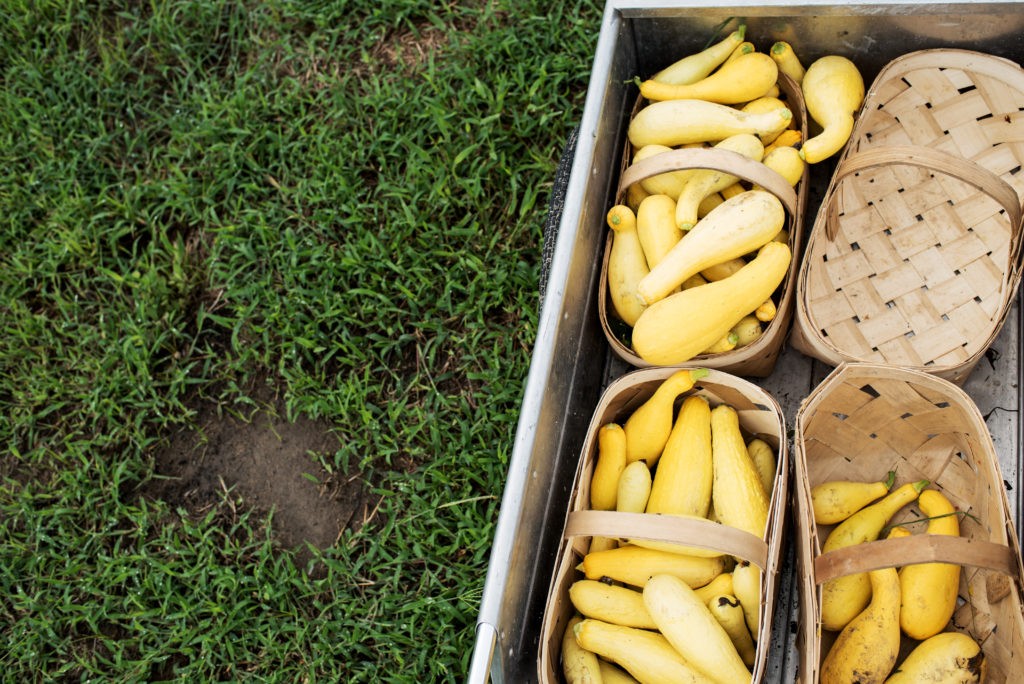
The mission of the Conetoe Family Life Center, led by Richard Joyner, is to get whole, healthy foods onto the tables of Conetoe’s families. Photo/Caitlin Penna
“Historically, sharecropping has been marked by racism and economic disparity, and sharecroppers, or the majority of black farmers, in their whole history could never make a profit from farming,” Joyner explains. “So there was no wealth that my father could leave his family, because sharecropping didn’t provide it. It infuriated us as his children, that no matter how hard you work, there would be no profit. How depleting.”
Sharecropping: Slavery by another name
Enduring even today, sharecropping began as a precarious solution to an even more precarious problem in the South, namely the economic wreckage wrought by the end of the Civil War and the emancipation of slaves. As of 1865, Confederate currency was useless and federal dollars were in short supply throughout the South. Still, former slaves sought jobs, and landowners sought laborers, not to mention the social and economic supremacy they had enjoyed for centuries. Sharecropping was their crooked solution, in which former slaves and poor white farmers worked for wealthy white planters in exchange for a subsistence-level portion of the crop.
The sharecropper owned nothing of his or her own and depended entirely on the landowner as well as on the crop itself for their family’s survival. This encouraged farmers to work their hardest while keeping them ultimately tied to the land, a system as exploitative as slavery itself. Pulitzer Prize-winner Douglas A. Blackmon called sharecropping “slavery by another name.”
“I don’t think people of privilege really grasp what their privilege is still costing people who don’t have it.”
Joyner has yet another name for it: stealing. “And yet both of them (landowner and sharecropper) sit in church on Sunday,” he adds.
“My father was a strong person of faith, and the guy that was stealing from him was a person of faith. So you wonder, how can both people be Christian and serve the same God? Apparently, the God that we serve doesn’t have any problem stealing. And that man don’t have no problem stealing the future of one person’s child while he’s trying to make sure his child got a great future.”
The gift of a soul
Joyner is a pastor and preacher molded, no doubt, by the trauma of sharecropping and systemic racism. Yet, his parents taught him how to listen and be obedient to God – not the God of the landowner, but a God who works to break systemic racism and give life to black communities. “My parents taught me that obedience to the spirit of God is not based on how I feel, but it’s based on my soul. And you must have a soul deep enough to respond to the mental and physical cruelty that the generations have imposed on you. The gift that my parents gave me was a soul.”
That soul eventually led Joyner into vocational ministry. In 2006 he moved to Conetoe, (pronounced kuh-NEE-tuh), North Carolina, to help the 93-year-old pastor of Conetoe Chapel Missionary Church, a role he would soon assume. Almost immediately, Joyner was inundated with early deaths among his congregation. By the end of his first year, he had presided over 30 funerals, largely for people under the age of 60 and even 50, he says. Almost all had died from chronic disease. Diabetes, high blood pressure and obesity were rampant. Poor nutrition was systematically killing off a generation.
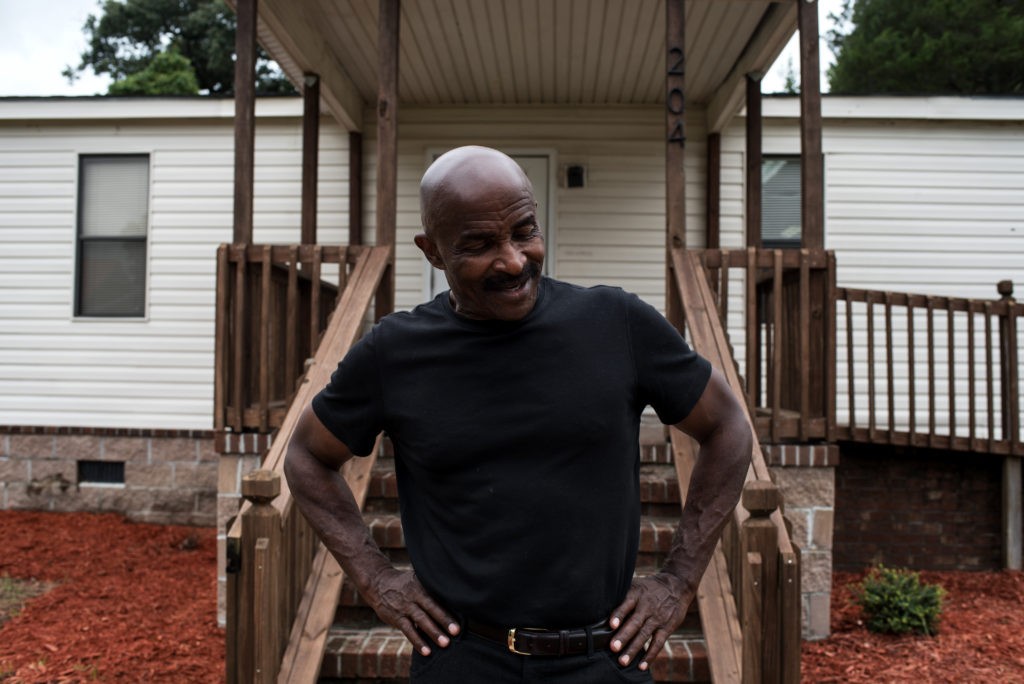
Richard Joyner, the son of a sharecropper in Eastern North Carolina, reminds himself of his father’s wisdom – “Don’t be angry at the land, the farm has not stolen anything from you. It’s the person who has stewardship over the farm. That’s the thief, not the soil. The soil will give to any person.” Photo/Caitlin Penna
“What chronic disease and unhealthy lifestyles were doing to us was real obvious in the premature deaths,” Joyner says. “It was real obvious in the chronic diseases. It was real obvious in our children. They reflected a lot of that. It was a lot, a lot of pain being covered. How do you get back 40 years’ worth of a human life? How do you get back 40 years’ worth of wisdom to a family?”
“So when you’re hopeless and you just don’t have it, you look and say, ‘God, what is the next step?’” he continues. “‘I can’t purchase enough food for this community. My pockets aren’t that deep.’ But my prayer was that my faith would be that deep, and that faith would pull us out of here.”
Poverty and health
Conetoe is a small, isolated farming community in Eastern North Carolina, nestled just 10 miles off the Tar River. Conetoe and the entirety of Edgecombe County remain a haven for the nation’s most storied black communities. Princeville, just five minutes north of Conetoe, is the oldest town incorporated by African Americans in the United States, founded by freed slaves in 1885.
Most of Conetoe’s 300 residents depended on the textile industry or agriculture, both of which are largely defunct in the region. This economic shift caused vast unemployment throughout the Carolinas and hit isolated towns like Conetoe the hardest. When rural communities lose access to industry, they lose access to employment and health care as well as to everyday resources that urbanites and suburbanites take for granted, such as grocery stores and pharmacies.
Paul Cunningham, former dean of the Brody School of Medicine at East Carolina University, was working at a hospital in Rocky Mount at the time and began collaborating with Joyner, who was also working part-time as a chaplain. Cunningham assessed that 90 percent of the diseases that were killing Conetoe’s residents could be managed through proper nutrition. The only problem, he explains, is that systemic poverty – not only based in race but ultimately in zip code – automatically works against the health of black communities.
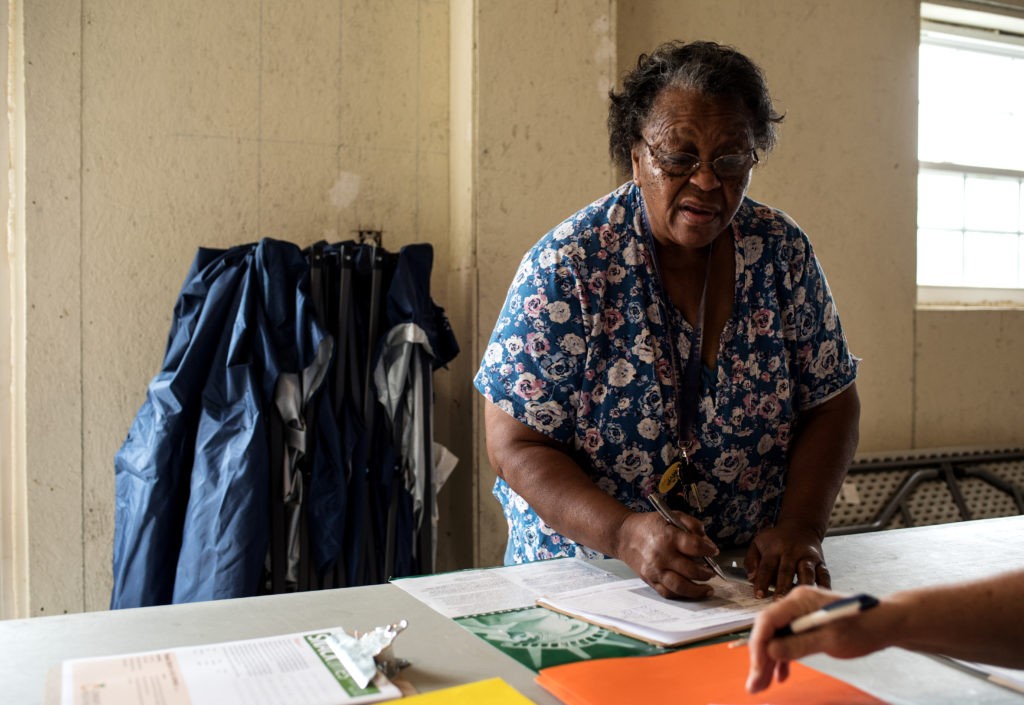
“Good health is a time-consuming enterprise, and you have to make a decision as to whether you are going to work, sleep at night or grow vegetables in your backyard,” Paul Cunningham, former dean of East Carolina University’s Brody School of Medicine, says. Photo/Caitlin Penna
“Poverty tracks with race in rural eastern North Carolina and it affects everyone from a health point of view,” Cunningham says. “If I go to a doctor’s office and I’m obese or have hypertension, for example, I’ll probably get a few pills. First of all, they’re expensive, so I begin to ration the pills and take them every other day. Then, there is no healthy food I can purchase over the counter because all of the highfalutin supermarkets are 15 miles away. And my car, if I have one, is not a world-beater and I’ll have to put gas in it to buy broccoli. Guess what? It’s not going to happen.”
A food desert in the middle of fertile soil
This is why some refer to communities like Conetoe as “food deserts,” though Conetoe was not a food desert and Joyner knew it. Conetoe had always been a farming community. People knew how to sustain themselves through long winters and no landowner was coming to save them – or him. He and his community would reclaim their own health by turning again to the land, he reasoned. By growing their own food and teaching people how to prepare it they could manage, and even dial back, the chronic disease epidemic.
But the truth began to dawn on Joyner: If he sought new life for his community, he would have to reopen the wounds of farming, to reengage the soil that so stoked his anger as a young man. How could he return to the very practice that stole from his father and his family’s future? “Sharecropping and my previous relationship with farming was not something I wanted to get back into,” he says. “There was a lot of resistance, a lot of pain. I had barriers up. They said, ‘Don’t go back over there!’”
Then his father’s words returned to him: “Don’t be angry at the land. The farm has not stolen anything from you. It’s the person who has stewardship over the farm. That’s the thief, not the soil. The soil will give to any person.” Luckily, Joyner says, the gift he inherited from his father and mother was “a deep abiding faith that God is greater than any thief in the world.” He didn’t have to quell his rage for the landowner, but he could redeem his and Conetoe’s relationship with the land. For once, they could reap the full benefits of what they sowed and do it without the help of grants or plans made in air-conditioned offices.
“There was no wealth that my father could leave his family, because sharecropping didn’t provide it. . . . No matter how hard you work, there would be no profit.”
“My past kept me from seeing the potential because I couldn’t see nothing in front of me. Nothing but my own pain,” Joyner says. “When I was finally delivered from my pain, I saw the land. I saw opportunities. I saw this beautiful place where we could grow ourselves, manage ourselves to a place of health and educate our children at the same time, feed our community, build our social skills and sustain a community.”
After too many funerals had passed, Joyner stood up before his congregation and laid out his vision. Not only would the funerals finally cease, but Conetoe would literally reclaim its strength from the ground up, starting with nutritious, homegrown produce. The Conetoe Family Life Center (CFLC) was born, and its focus, then and now, is to grow fruits, vegetables and other whole foods and get them onto the tables of Conetoe’s families.
An oasis of community life
Conetoe is indeed isolated, but Joyner determined the only transformation worth having would come from within the community, not from another landowner. “So we can say to ourselves, ‘We are not poor. We do not live in a food desert. And we do not need Walmart to give us access to fresh, locally grown vegetables,’” he explains. “That’s our determination, not a food chain’s determination.”
Conetoe had once been full of able farmers, Joyner adds, but people had forgotten the ways of his mother, who always grew organic vegetables and knew how to preserve anything, in its original juices, all winter long.
“We don’t have anything against food chains,” Joyner continues, “but if God gives us access to soil, to a healthy body and to seeds, why then do I see myself in a food desert? I see myself in an oasis.”
“My parents taught me that obedience to the spirit of God is not based on how I feel, but it’s based on my soul. And you must have a soul deep enough to respond to the mental and physical cruelty that the generations have imposed on you.”
Joyner and the CFLC set out to grow that oasis, first by acquiring nearby land on which to produce fruits and vegetables. Leadership began with children and youth, who would lead the community in establishing new ways of living. The following summer, the CFLC began hosting summer camps for the children and teenagers of Edgecombe County, in which they would plant and harvest local produce as well as develop social, financial and leadership skills. Before long, more than 80 young people were helping Joyner plan, plant and harvest nearly 50,000 pounds of produce each year.
Community elders hosted pro bono classes on cooking and canning vegetables. The children even turned a recycled school bus into a honey-bee hive, learning the science behind beehives and harvesting honey to sell at farmers markets. Since its inception 12 years ago, the CFLC has grown from one 11-acre garden plot to more than five large-scale sites, including a 25-acre plot. From these sites, the center distributes produce annually to local families and also serves as the distribution site for Community Support Agriculture boxes.
Each site is free and open to the community. That means there’s no such thing as stealing, Joyner says. “You can’t steal from your own self. It’s yours, just go out there and get it. Just be respectful to the vegetables, that’s all we ask. Don’t take a spirit of stealing, because it’s the soul of things that makes them grow.”
“Our only prayer was that the deaths would stop,” he adds, “that the kids would take a different route and we could create a human engine that would cause us to be healthy and sustainable, changing the culture of how we live our lives.”
Justice means mutual vulnerability
As the movement grew, the CFLC also deployed lay health coaches among the congregation. These coaches are simply responsible for helping a select group of individuals and families learn how to access and cook fresh, whole foods such as sweet potatoes, which thrive in North Carolina soil. Sweet potatoes are also rich in vitamins and minerals and even help improve blood sugar regulation.
Lo and behold, the community began to glimpse the miraculous effects of their new diet. Some residents even began dropping medications, none more than Miss Minnie Pearl, who came off of 21 medications because of her improved diet and nutrient intake. Others, like Robin Pittman, one of the CFLC’s young participants, were inspired to continue in public health. Pittman, whose mother died of cancer, first participated in the center as a young woman. After college, she went on to earn a master’s degree in physical therapy. She worked with women in Gaza on health and nutrition.
“So many of the children whose parents could not afford summer camps have watched their kids not only come and afford it but also buy what they need for back-to-school (meals) and reduce their food bill,” Joyner explains. “They’re also able to study the genetics of their family and match foods for a healthier outcome. And we see families save so much money when they come off of medication. If we can get our people living longer and still contributing to their family, we really can turn this around.”
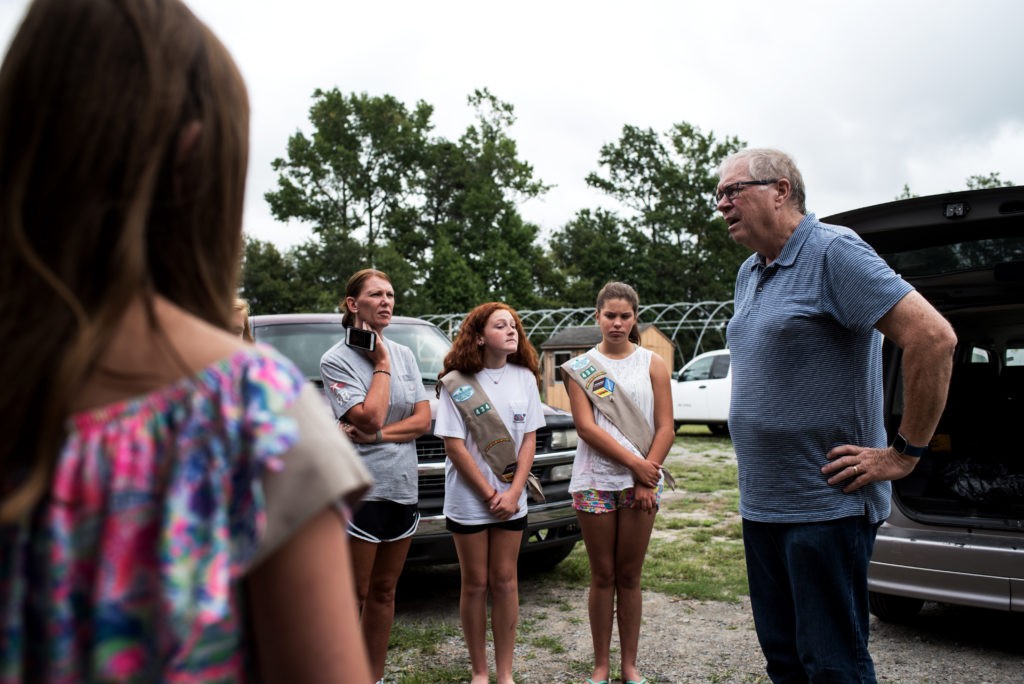
Partner and ally LaCount Anderson leads a troup of Girl Scouts on a tour of one of Conetoe Family Life Center’s main gardens and distribution points. Photo/Caitlin Penna
Conetoe began to manage themselves back to health, Joyner says, but against all odds. Privilege and racism have imposed enough economic, social and physical challenges on Conetoe, as have the community’s own residents, he adds. That’s far more than one person – or even an entire community – can brave singlehandedly. “You just don’t have the resources, human, natural, sustainable resources,” explains Joyner. “In spite of all that, it works, but because of God.”
Still, Joyner can’t get that landowner out of his mind. Perhaps he never will. “I don’t think people of privilege really grasp what their privilege is still costing people who don’t have it,” he declares finally.
As far as Joyner is concerned, if you don’t have risk or vulnerability in the game, you have no business playing it. That’s why the Conetoe Family Life Center restricts its partners to those who are looking for a relationship first and foremost, not to get paid or “do human development.” Any other system would resemble too closely the sharecropper and his landowner, a repeating cycle of condescendence and racism.
Justice means mutual vulnerability between partners on equal ground, he explains.
“We don’t have anything against food chains, but if God gives us access to soil, to a healthy body and to seeds, why then do I see myself in a food desert? I see myself in an oasis.”
“I can’t help somebody else and then don’t want to experience what they’re going through. That’s the illusion. The people that are trying to help people do not want to experience any vulnerability with the people they’re trying to help, and that includes the church. We want this free ride to heaven, but if anybody has studied the life of Jesus, they would see that to give life it cost him his life.”
Reparations and truth-telling
In addition to solidarity, justice also means reparation, he says. While Conetoe has redeemed its relationship with the land and fought for better health, true justice has proved more elusive. “We have been economically robbed throughout history by people of privilege,” he says. “Justice would look like us waking up and being honest and willing to restore wherever we have robbed or wherever we are privileged because of what has been robbed.”
But no matter how many have robbed from Conetoe, the land hasn’t stolen a dime, Joyner repeats. “The soil will give to any person.”
The reluctant farmer has come a long way from the fury of his youth. The anger hasn’t diminished, however; it’s been redirected. And his father’s wisdom, now decades old, still illuminates the path through – not around – his pain and into North Carolina’s loamy, life-giving soil. There, he believes he has fulfilled his father’s greatest legacy.
“My gift from my father is how he loved his family and how he loved his community, and that’s what he woke up every morning for. He didn’t wake up every morning to check his stocks.
“That’s where I’m at. I wake up every morning with the hope that God would teach us how to manage our lives and our children’s lives into a healthier place without stealing or robbing or violating anybody, but by telling the truth.”
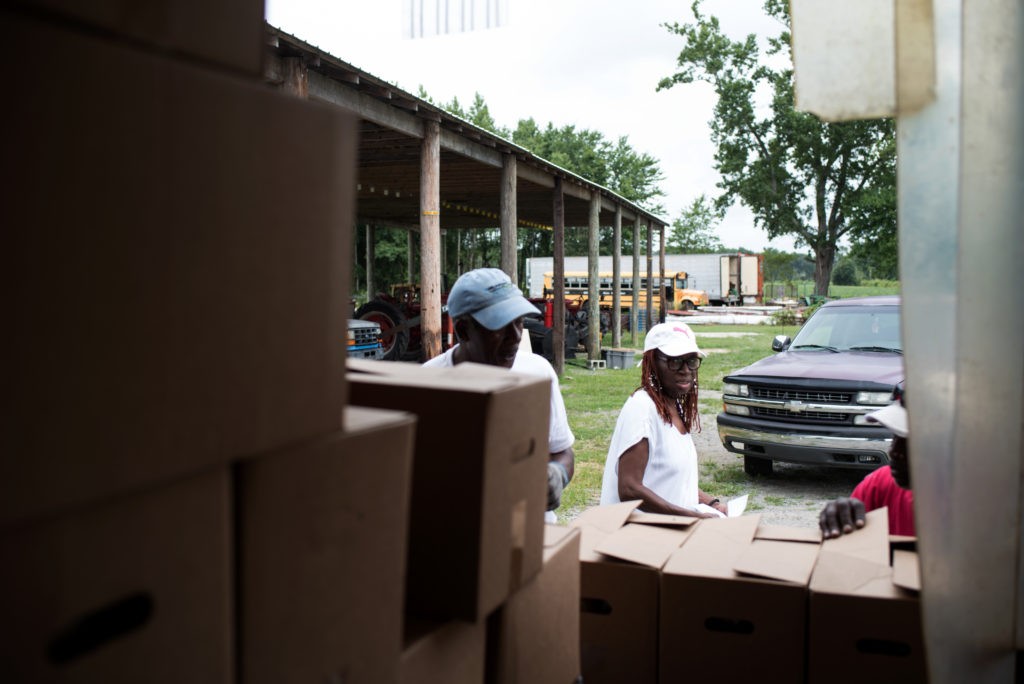
Rosa Joynersteele serves as a lay health coach among the congregation of Conetoe Chapel Missionary Church by teaching families how to prepare whole healthy foods. Photo/Caitlin Penna
Read more in the Conetoe series
Justice through farming: The soil will give to any person
Being black in the United States is decidedly bad for your health
Video: Richard Joyner discusses Conetoe’s pathway to health
Video: Richard Joyner explains lay health coaches
Related news:
Youth-led farming, bee-keeping ministry inspires CBF field personnel
Hurricane season has ended (yay) but the poor aren’t cheering
Moving beyond hope to confidence in fight against hunger
How a North Carolina minister sowed seeds of hope in a food desert (via Modern Farmer)
Related commentary:
5 reasons why reparations talk makes white people crazy | Alan Bean
I’m awaiting a kidney transplant. I care about our nation’s health care crisis. But churches should too | Kathy Manis Findley
Racial justice: apology without restitution, lamentation without transformation | Susan M. Shaw
A Lenten reflection about repentance, reparations and resistance | Wendell Griffen
As told through the Conetoe series, the mission of the Conetoe Family Life Center, led by Richard Joyner, is to get whole, healthy foods onto the tables of Conetoe’s families. “Good health is a time-consuming enterprise, and you have to make a decision as to whether you are going to work, sleep at night or grow vegetables in your backyard.”
This series in the “Faith & Justice” project is part of the BNG Storytelling Journalism initiative. In “Faith & Justice,” we tell the stories of people and organizations that are helping to transform their communities, bending the “arc of the moral universe” toward justice.
_____________
Seed money to launch our Storytelling Journalism initiative and our initial series of projects has been provided through generous grants from the Christ Is Our Salvation Foundation and the Eula Mae and John Baugh Foundation. For information about underwriting opportunities for Storytelling Projects, contact David Wilkinson, BNG’s executive director and publisher, at [email protected] or 336.865.2688.

